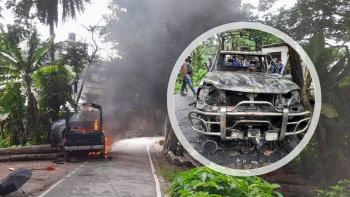The year that was for us

1and 9 have always been the most significant numbers in my life. Most of what has happened to me (save one) has always taken place on dates that add to either 1 or 9. I am super superstitious. When I take flights, I add up flight numbers to check if they add up to 1 or 9, so that I can rest in peace and not suffer air fright. I also add up numbers of my hotel rooms so that I know whether my stay is going to be meaningful or bland. So, when we hit 2016, I almost instantly knew that it would be a year that would be, at least, eventful. But little did I know that assessing 2016 was going to get tricky mid way. Holey marked 2016 so badly that no good news was good enough, no achievement looked worthy of mention, and none looked like a hero. With Holey, it wasn't as if we had just lost people there; for most of us, we had lost a piece of the fabric of pride belonging to Bangladesh. In spite of 45 years of terrorist attacks in Europe, consisting of 4,724 people dying from bombings, 2,588 being assassinated, 159 from hijackings, 114 from building attacks and thousands being wounded or going missing, ironically the news of Bangladesh always takes the world by storm. Somehow…we are always on the disaster map. Freedom of expression is almost never as expected, democracy is always apparently 'wavering', freedom status is 'partly free' (according to the Freedom House report), political pluralism and participation always questioned, and corruption apparently "endemic". In the report of Human Rights Watch, in 2016 Bangladesh has been termed as pursuing an authoritarian direction, with the authorities attempting to hinder civil liberties. But, luckily there are also reports out there that mention that the country has "maintained an impressive track record on growth and development"(World Bank) while growing nearly at 6 percent per annum over the last decade, with more than 15 million Bangladeshis moving out of the poverty level, and with life expectancy, literacy, and per capita food intake increasing in a landmass of 147,570 square kilometres which is home to 160 million people of the world out of which some 50 million or 30 percent are between the ages of 10-24. There are reports that also predict that Bangladesh is all set to enjoy a demographic advantage for the next couple of decades, while becoming a middle-income country by 2021, impressing the entire world, if only the growth is inclusive, if only the urbanisation process is more effective and if only there's macroeconomic stability and if only majorly, out of other factors, the country can address the energy and infrastructural deficits.
Seems that there are just too many "if-only" factors surrounding Bangladesh. That's not surprising at all. People from all over the world have a difficulty figuring us out. Where does all that spirit come from, they wonder. From within us, we respond.
What else sung from within us this year? Our spirit of justice soared with Motiur Rahman Nizami and Mir Quasem Ali being hanged this year. Our spirit of pride reached newer heights with Bangladesh topping the South Asian countries in gender equality for the second consecutive year, standing at a 72nd ranking out of the 144 countries covered in the Global Gender Gap Report 2016 published by the World Economic Forum (WEF). Our spirit soared when there were young geniuses like Ian Shakil breaking boundaries with technological leaps. Our spirits were soothed with the workers returning to work in Ashulia, assuring that all's well with the industry and the USD 50 billion export by 2021 is not just a dream.
So, is all well with Bangladesh? In spite of the most turbulent turns in global economy and politics, Economist, in its Christmas issue brilliantly summed up the global spirit by appealing to all to nurture the "restless urge" for the liberals. All's not over for the world. Hope's not dead yet for anyone including us. For example, Democracy in Bangladesh was pronounced dead quite a while back. But thanks to the CPR administered by the collective national conscience, it seems to be working better now. With Ivy breezing through the election, with Obaidul Kader visiting ailing Manna at the hospital, the breeze of democracy smells sweet indeed.
For me personally, 2016 ushered in promise of yet another brilliant year. My optimism peaked with a movie, 'Aynabaji' I watched a few weeks back. 'Aynabaji' deserves kudos. It smells of Lacan as we see ourselves in the mirror in true colours; it celebrates Camus with his L'etranger in a more evolved manner and style; it aptly reflects on the erroneous impressions that we impose on others of ourselves and how quickly we switch places to escape and to punish the other. The movie critiques the judiciary, the law enforcing agencies and yet gets away with a clean chit of a good story teller. It reminded me of another movie called "NO" that I watched in 2012 where René, an in-demand advertising man working in Chile in the late 1980s, uses advertising tactics in political campaigns, when the Chileans decided against the dictator Augusto Pinochet. Often story tellers speak of truths in far bolder fashion than many of us ever dare to do. With 2017 approaching, truth should be best told through creativity and in case if reality hinges on suspicion, may we all find a way to creatively critique, and salute tolerance.
Happy New Year to all Bengalis and the rest who live on this soil of ours and beyond!
The writer is Managing Director, Mohammadi Group.

 For all latest news, follow The Daily Star's Google News channel.
For all latest news, follow The Daily Star's Google News channel. 



Comments